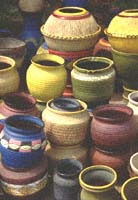Jan 25, 2016
Pottery
Pottery plays a very important role in the indigenous culture of the various ethnic groups in Ghana. In the Volta Region, the art of pottery making, the meaning and uses of the artifacts are enshrined in some deep philosophies that permeate the socio-cultural life of the people.
The Ewé have over 600 deities to turn to in times of need. Many village celebrations and ceremonies take place in honor of one or more deities. The Ewe also weave Kente cloth, and their more geometrical patterns contain symbolic designs handed down through the ages. The Ewe occupy southeastern Ghana and the southern parts of neighboring Togo and Benin. Most Ewe were farmers who kept some livestock, and there was some craft specialization. On the coast and immediately inland, fishing was important, and local variations in economic activities permitted a great deal of trade between one community and another, carried out chiefly by women.
Traditionally, pots play very important roles in the culture of the Ewe beginning from birth through to death and even after death. They are used in performing customary rites, boiling herbs, cooking and storing food, liquid substances. Pots that are used for performing customary rites, such as k?nuze (ritual pot) are not made by women who are in their menstrual period or have had sexual intercourse with a man during the pot making process.
Information indicates that, clay, the major raw material in pottery production, is still abundant in notable Ewe communities that make it possible for the production of pots. The pottery production process involves clay winning and preparation, forming, decorating and firing, and sometimes smoking. The two most extensively used forming methods are pinching and coiling. Indigenous pottery as a domestic art has for many years been the exclusive preserve of women, especially the elderly. While some women opt for pottery as a complete occupation, others take it as extensions of domestic activity where money accrued from the proceeds go into the provision of household necessities.
Important pottery centers in the Volta Region include Kpando, Ve-Koleonu and Vume.

